

Self-management
People living with MCAS often need to take an active role in understanding and managing their condition and explaining it to others. The information and resources on this page have been prepared based on the latest scientific understanding, as well as practical experiences shared by people living with MCAS. These can be downloaded for free below.
If you are a child or young person looking for support tailored to you, please take a look at our dedicated pages.
We hope our self-management tools and resources will empower people living with MCAS to better understand and manage their condition - helping to achieve greater symptom stability when used alongside medical management.
For further support in managing your MCAS, please take a look at our pages on Managing Your Environment and Preparing for a Flare.

Additional Support
We’ve put together some resources to help you manage your condition.
Yuka App is an independent app that scans food and cosmetic products in order to know their impact on your health.
Nimbus Cards are personalised information cards that communicate your specific medical needs quickly and effectively.
NHS Patient Choice: Did you know you have the right to choose where you receive treatment within the NHS?
Access to Work: If you’re employed and need support to manage your condition in the workplace.
Navigating the Workplace: Discover tips on navigating the workplace with chronic illness.
Coping with Pain: Strategies for coping with pain.
"Despite being seen by multiple specialists, nobody looked at my issues as a whole rather than as separate symptoms. Through trial and error, I have figured out what works for me.”
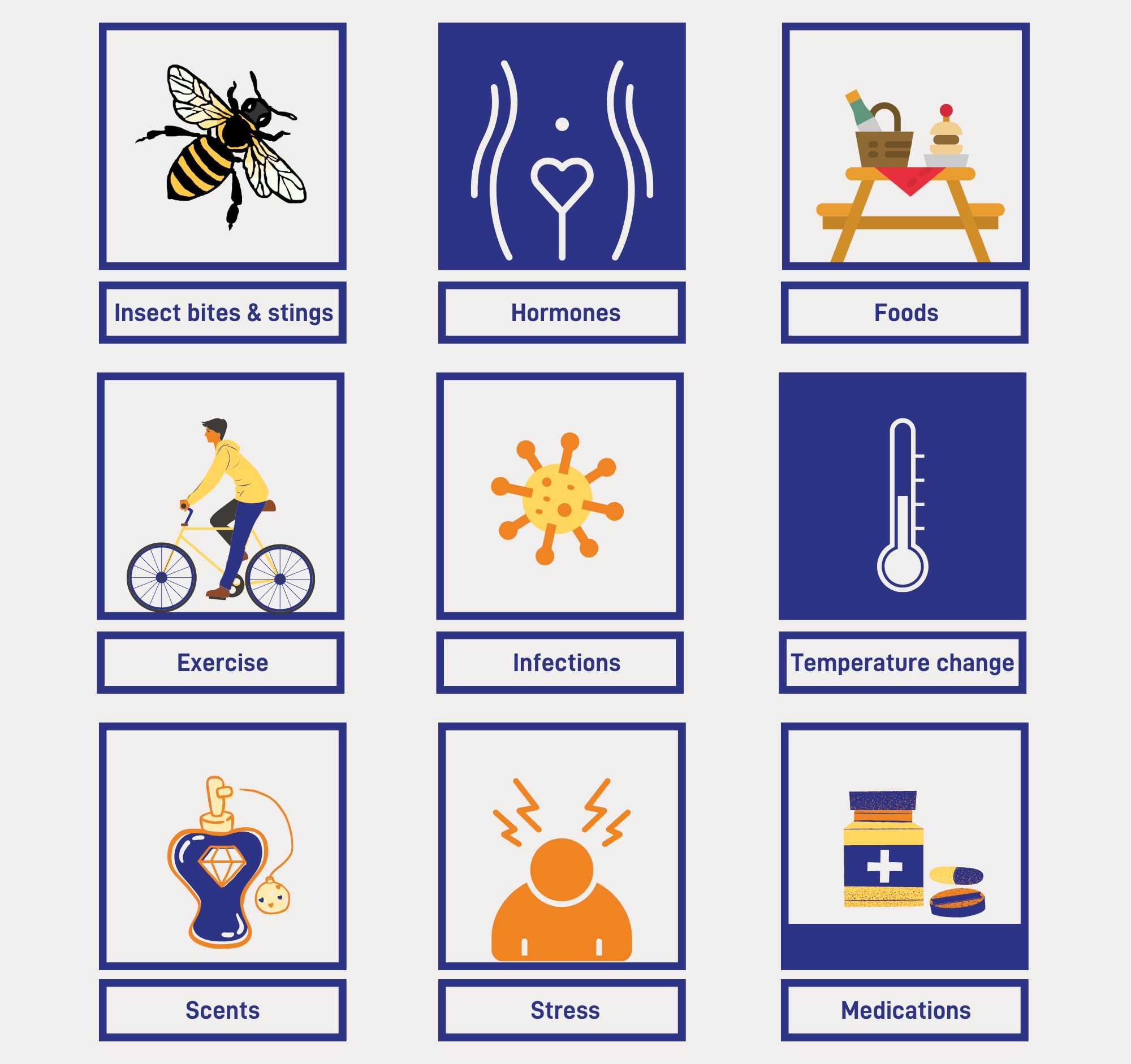
Common triggers
Mast cells are a key part of your immune system involved in fighting infections and healing wounds. To do this, mast cells detect different triggers. Normally the triggers will be genuine threats to your health, but in MCAS, mast cells respond to triggers that are usually harmless. Triggers may include foods, fragrances and chemicals in products, stress, changes in temperatures, medicines and exercise, to name but a few.
Mast cells contain chemical mediators that are released in response to triggers. There are over 1000 mediators that can be released. The most commonly known are histamine and tryptase.
Our community have provided their useful tips on products and processes they have found helpful in avoiding triggers. You can take a look at our Community Tips page here.

Identifying triggers and symptoms
Identifying patterns of triggers and symptoms is the first step to managing them. It can be useful to keep a diary and log information, such as what the weather was like that day, what you ate, which medications you took, or what kind of activity you were doing before the symptoms began.
Unfortunately, MCAS triggers can vary and change over time so identifying them and managing symptoms can be challenging. However, people living with MCAS often find they are able to isolate and therefore avoid (where possible) many of their triggers over time, leading to an overall improvement in stability.
The self-management resources tabs, below, include diary sheets, logs, smartphone apps and other tools that you may find useful.

Managing triggers
Self-management means trying to avoid exposure to triggers to help prevent symptoms. Some triggers are easier to avoid than others, with environmental triggers being particularly difficult to manage. Planning ahead of time can help to limit your exposure where possible, and avoiding locations where triggers cannot be removed can help to reduce the frequency and severity of symptoms you may experience.
Many members of our community have told us that good quality air-purifiers have made a significant difference to their exposure to triggers in internal spaces such as their home or office.
We recommend sharing information about your MCAS such as triggers and medications with those around you to help limit any accidental exposure and make sure those around you know what to do if you have a severe reaction and are able to support you in this process and beyond.

Dietary triggers
Many people with MCAS find certain diets helpful for managing their symptoms. For example, low histamine, gluten free, lactose free, low oxalate or low amine diets. Keep in mind that not all of these diets will work for everyone as every person with MCAS is unique. It is also possible for multiple food triggers to cause symptoms, so a combination of dietary management strategies may be useful.
Elimination diets are designed to help people to avoid specific foods or food groups in order to recognise if the food is a trigger. Specialist support from a nutritionist or dietician is often needed to help people with MCAS make changes and find what works for them. The tools and resources on this page may support more productive conversations with a nutritionist or dietician if their knowledge of MCAS is limited.
Elimination diets in children should only ever be undertaken with your child's doctors and dietetic team.
The tabs below include practical information and resources to help people with MCAS manage triggers.

What is Mindfulness?
In it's simplest form, mindfulness means paying attention to the present moment, without judgement. Focusing on the here and now, in turn, allowing your mind to quieten, being able to soften the noise within your brain and around you.
If practised regularly, the benefits can be profound, including, but not limited to, improved focus and attention, reduced anxiety and depression, reduced chronic pain, boosted immune system, reduced stress, promoted better sleep and improved emotional regulation and resilience.
You can read more here.
Trigger information
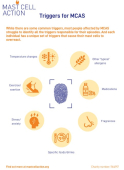
Triggers
This resource details some of the more common triggers of Mast Cell Activation Syndrome.
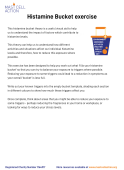
The histamine bucket exercise
This histamine bucket is a useful visual aid in trying to understand the impact of factors contributing to histamine levels.
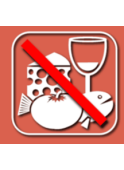
Swiss Interest Group Histamine Intolerance (SIGHI)
SIGHI is an organisation that provides information about histamine-related disorders.
The low histamine chef
Blogs, books and recipes written by the low histamine chef (Yasmina Ykelenstam), a health journalist who has managed her own histamine intolerance for more than 10 years.
Self-management resources
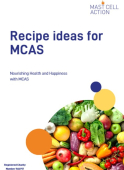
Recipe Ideas for MCAS
From our Nourishing Health & Happiness with MCAS series — simple, nourishing recipes designed to support digestion, comfort, and everyday enjoyment.
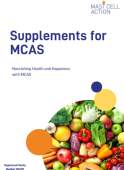
Supplements for MCAS
From our Nourishing Health & Happiness with MCAS series — evidence-informed guidance on supplements that may support wellbeing in MCAS.
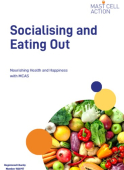
Socialising and Eating Out
From our Nourishing Health & Happiness with MCAS series — practical tips for enjoying meals out and social occasions while supporting your health and comfort.
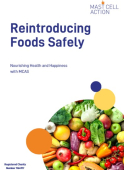
Reintroducing Foods Safely
From our Nourishing Health & Happiness with MCAS series — a gentle guide to reintroducing foods, helping you expand your diet with confidence and care.
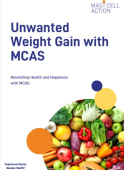
Unwanted Weight Gain with MCAS
From our Nourishing Health & Happiness with MCAS series — explore possible causes of weight changes and find balanced ways to support a healthy body and mind.
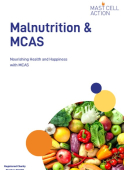
Malnutrition and MCAS
From our Nourishing Health & Happiness with MCAS series — understand the risks of malnutrition with MCAS and learn how to nourish your body safely and effectively.
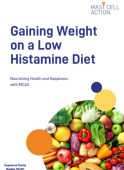
Gaining Weight on a Low Histamine Diet
From our Nourishing Health & Happiness with MCAS series — gentle, practical ideas for maintaining or gaining weight while following a low histamine approach.
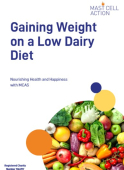
Gaining Weight on a Low Dairy Diet
From our Nourishing Health & Happiness with MCAS series, discover nourishing, dairy-free or low dairy ways to support healthy weight gain while meeting your body’s needs.
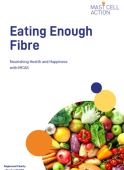
Eating enough fibre with MCAS
From our Nourishing Health & Happiness with MCAS series — discover simple, gentle ways to include more fibre for better gut health and overall wellbeing.
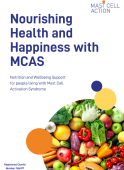
Nourishing Health and Happiness with MCAS
We have worked with registered dietitian, Chloe Hall, to explore some of the most common diets followed by people with MCAS, and the key nutritional concerns that often arise. In this resource, we’ll look at practical ways to support your diet when living with MCAS.
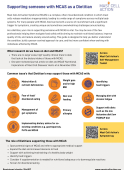
Supporting someone with MCAS as a Dietitian
Supporting Someone with MCAS as a Dietitian is a practical resource designed to help dietitians understand and support people living with Mast Cell Activation Syndrome. It offers guidance on the unique challenges that MCAS presents, particularly around food, nutrition, and symptom management.

Speaking to Your GP: Language and Tips for Effective Communication
This guide has been created to help you communicate more confidently and effectively with your GP. It offers practical language suggestions that can help you explain your symptoms, request support, and build a more collaborative relationship, whether you have a confirmed diagnosis or are still seeking answers.
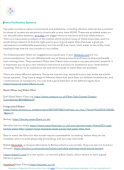
Introduction to Water Purifiers
Handout on different types of water purifiers, created by Deborah Bircham
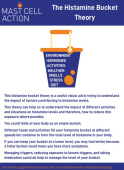
The Histamine Bucket Theory
This histamine bucket theory is a useful visual aid in trying to understand the impact of factors contributing to histamine levels.
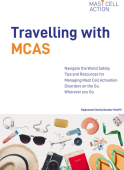
Travelling with MCAS
This downloadable booklet contains tips and resources for managing Mast Cell Activation Disorders on the go, wherever you go.
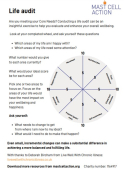
Life Audit
Are you meeting your Core Needs? Conducting a life audit can be an insightful exercise to help you evaluate and enhance your overall wellbeing.

Triggers
This resource details some of the more common triggers of Mast Cell Activation Syndrome.
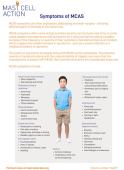
Symptoms of MCAS
This resource details some of the more common symptoms of Mast Cell Activation Syndrome.
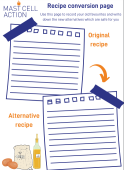
Recipe Conversion
You can use this blank recipe conversion page to note down any MCAS friendly changes you have made to your favourite recipe's.
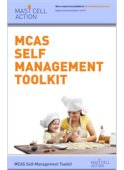
MCAS Self-management toolkit
This toolkit contains information about substances in food and in the environment that can affect mast cell activity or trigger MCAS symptoms. It also includes practical advice to help you understand and avoid these triggers, as needed.
MCAS symptom log

The histamine bucket exercise
This histamine bucket is a useful visual aid in trying to understand the impact of factors contributing to histamine levels.
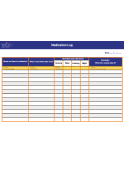
Medication log - adult
A medication timetable to log daily medications
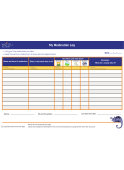
Medication log - children
A medication log blank which you can use to record medications, dosages and medication times in order to keep on track.
Self-management apps
Ask Ingrid app
A free app developed by the Food Intolerance Network, Australian Society for Public Health. It contains comprehensive information about foods containing histamine, sorbitol, gluten, lactose, fructose and FODMAPs.
Baliza.de. Histamine, fructose & co food intolerance app
A smartphone app that provides practical, evidence-based information about foods containing common triggers such as histamine, tyramine, lactose, fructose, sorbitol and fructose.
Monash University FODMAP app
A smartphone app developed by experts at Monash University. Contains detailed information about foods containing FODMAPs as well as a useful symptom tracker feature.
Become a friend
Sign up to become a Friend of Mast Cell Action so we can keep you up to date on our progress and on how to get involved in our latest campaigns and initiatives.
Donate
Mast Cell Action relies entirely on the generosity of people like you. Please make a donation now and together we can make a difference to those affected by MCAS.







